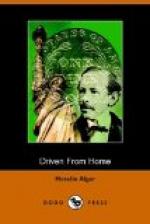“Should Mr. Gibbon find, on opening the safe to-morrow morning, that the box is gone, it may lead to an attack upon my house.”
“I wish you to leave the box in the safe.”
“But I understand that you advised me to remove it.”
“Not the box, but the bonds. Listen to my plan. Cut out some newspaper slips of about the same bulk as the bonds, put them in place of the bonds in the box, and quietly transfer the bonds in your pocket to your own house. To-morrow you can place them in the bank. Should no burglary be attempted, let the box remain in the safe, just as if its contents were valuable.”
“Your advice is good, and I will adopt it,” said Jennings, “and thank you for your valuable and friendly instruction.”
“If agreeable to you I will accompany you to the office at once. The bonds cannot be removed too soon. Then if anyone sees us entering, it will be thought that you are showing me the factory. It will divert suspicion, even if we are seen by Stark or your bookkeeper.”
“May I go, too?” asked Carl, eagerly.
“Certainly,” said the manufacturer. “I know, Carl, that you are devoted to my interests. It is a comfort to know this, now that I have cause to suspect my bookkeeper.”
It was only a little after nine. The night was moderately dark, and Carl was intrusted with a wax candle, which he put in his pocket for use in the office. They reached the factory without attracting attention, and entered by the office door.
Mr. Jennings opened the safe—he and the bookkeeper alone knew the combination—and with some anxiety took out the tin box. It was possible that the contents had already been removed. But no! on opening it, the bonds were found intact. According to Mr. Thorndike’s advice, he transferred them to his pocket, and substituted folded paper. Then, replacing everything, the safe was once more locked, and the three left the office.
Mr. Thorndike returned to the hotel, and Mr. Jennings to his house, but Carl asked permission to remain out a while longer.
“It is on my mind that an attempt will be made to-night to rob the safe,” he said. “I want to watch near the factory to see if my suspicion is correct.”
“Very well, Carl, but don’t stay out too long!” said his employer.
“Suppose I see them entering the office, sir?”
“Don’t interrupt them! They will find themselves badly fooled. Notice only if Mr. Gibbon is of the party. I must know whether my bookkeeper is to be trusted.”
CHAPTER XXIV.
The burglary.
Carl seated himself behind a stone wall on the opposite side of the street from the factory. The building was on the outskirts of the village, though not more than half a mile from the post office, and there was very little travel in that direction during the evening. This made it more favorable for thieves, though up to the present time no burglarious attempt had been made on it. Indeed, Milford had been exceptionally fortunate in that respect. Neighboring towns had been visited, some of them several times, but Milford had escaped.




